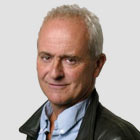Pervez Hoodbhoy in The Dawn
THE mental state of men ready and poised to kill has long fascinated scientists. The Nobel Prize winning ethologist, Konrad Lorenz, says such persons experience the ‘Holy Shiver’ (called Heiliger Schauer in German) just moments before performing the deed. In his famous book On Aggression, Lorenz describes it as a tingling of the spine prior to performing a heroic act in defence of their communities.
This feeling, he says, is akin to the pre-human reflex that raises hair on an animal’s back as it zeroes in for the kill. He writes: “A shiver runs down the back and along the outside of both arms. All obstacles become unimportant … instinctive inhibitions against hurting or killing disappear … Men enjoy the feeling of absolute righteousness even as they commit atrocities.”
While they stripped naked and beat their colleague Mashal Khan with sticks and bricks, the 20-25 students of the Mardan university enjoyed precisely this feeling of righteousness. They said Khan had posted content disrespectful of Islam on his Facebook page and so they took it upon themselves to punish him. Finally, one student took out his pistol and shot him dead. Hundreds of others watched approvingly and, with their smartphone cameras, video-recorded the killing for distribution on their Facebook pages. A meeting of this self-congratulatory group resolved to hide the identity of the shooter.
Khan had blasphemed! Until this was finally shown to be false, no proper funeral was possible in his home village. Sympathy messages from Prime Minister Nawaz Sharif and opposition leaders such as Bilawal Bhutto came only after it had been established that Khan performed namaz fairly regularly.
Significantly, no protests of significance followed. University campuses were silent and meetings discussing the murder were disallowed. A demonstration at the Islamabad Press Club drew about 450, a miniscule figure against the estimated 200,000 who attended Mumtaz Qadri’s last rites.
This suggests that much of the Pakistani public, whether tacitly or openly, endorses violent punishment of suspected blasphemers. Why? How did so many Pakistanis become bloodthirsty vigilantes? Evening TV talk shows — at least those I have either seen or participated in — circle around two basic explanations.
One, favoured by the liberal-minded, blames the blasphemy law and implicitly demands its repeal (an explicit call would endanger one’s life). The other, voiced by the religiously orthodox, says vigilantism occurs only because our courts act too slowly against accused blasphemers.
Both claims are not just wrong, they are farcical. Subsequent to Khan’s killing, at least two other incidents show that gut reactions — not what some law says — is really what counts. In one, three armed burqa-clad sisters shot dead a man near Sialkot who had been accused of committing blasphemy 13 years ago. In the other, a visibly mentally ill man in Chitral uttered remarks inside a mosque and escaped lynching only upon the imam’s intervention. The mob subsequently burned the imam’s car. Heiliger Schauer!
While searching for a real explanation, let’s first note that religiously charged mobs are also in motion across the border. As more people flock to mandirs or masjids, the outcomes are strikingly similar. In an India that is now rapidly Hinduising, crowds are cheering enraged gau rakshaks who smash the skulls of Muslims suspected of consuming or transporting cows. In fact India has its own Khan — Pehlu Khan.
Accused of cattle-smuggling, Pehlu Khan was lynched and killed by cow vigilantes earlier this month before a cheering crowd in Alwar, with the episode also video-recorded. Minister Gulab Chand Kataria declared that Khan belonged to a family of cow smugglers and he had no reason to feel sorry. Now that cow slaughter has been hyped as the most heinous of crimes, no law passed in India can reverse vigilantism.
Vigilantism is best explained by evolutionary biology and sociology. A fundamental principle there says only actions and thoughts that help strengthen group identity are well received, others are not. In common with our ape ancestors, we humans instinctively band together in groups because strength lies in unity. The benefits of group membership are immense — access to social networks, enhanced trust, recognition, etc. Of course, as in a club, membership carries a price tag. Punishing cow-eaters or blasphemers (even alleged ones will do) can be part payment. You become a real hero by slaying a villain — ie someone who challenges your group’s ethos. Your membership dues are also payable by defending or eulogising heroes.
Celebration of such ‘heroes’ precedes Qadri. The 19-year old illiterate who killed Raj Pal, the Hindu publisher of a controversial book on the Prophet (PBUH), was subsequently executed by the British but the youth was held in the highest esteem. Ghazi Ilm Din is venerated by a mausoleum over his grave in Lahore. An 8th grade KP textbook chapter eulogising him tells us that Ilm Din’s body remained fresh days after the execution.
In recent times, backed by the formidable power of the state, Hindu India and Islamic Pakistan have vigorously injected religion into both politics and society. The result is their rapid re-tribalisation through ‘meme transmission’ of primal values. A concept invented by the evolutionary biologist Richard Dawkins, the meme is a ‘piece of thought’ transferrable from person to person by imitation. Like computer viruses, memes can jump from mind to mind.
Memes containing notions of religious or cultural superiority have been ‘cut-and-pasted’ into millions of young minds. Consequently, more than ever before, today’s youth uncritically accepts the inherent morality of their particular group, engages in self-censorship, rationalises the group’s decisions, and engages in moral policing.
Groupthink and deadly memes caused the lynching and murder of the two Khans. Is a defence against such viral afflictions ever possible? Can the subcontinent move away from its barbaric present to a civilised future? One can so hope. After all, like fleas, memes and thought packages can jump from person to person. But they don’t bite everybody! A robust defence can be built by educating people into the spirit of critical inquiry, helping them become individuals rather than groupies, and encouraging them to introspect. A sense of humour, and maybe poetry, would also help.
'People will forgive you for being wrong, but they will never forgive you for being right - especially if events prove you right while proving them wrong.' Thomas Sowell
Search This Blog
Showing posts with label inquiry. Show all posts
Showing posts with label inquiry. Show all posts
Saturday, 29 April 2017
Friday, 6 May 2016
The lies binding Hillsborough to the battle of Orgreave
Ken Capstick in The Guardian
Police covered up their attacks on striking miners. And they used the same tactics after the football tragedy.
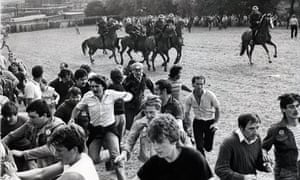
‘For those of us who were there when the ranks of police suddenly opened up and launched a cavalry charge, it felt like civil war.’ Photograph: Photofusion/Rex
Just eight miles separates the patch of ground on the outskirts of Sheffield where Orgreave coking plant once stood from Hillsborough stadium, where 96 people were unlawfully killed on 15 April 1989. To those of us involved in the miners’ strike in south Yorkshire in the 1980s, the so-called “battle of Orgreave” and Britain’s worst football disaster have always been linked.
It was a glorious summer’s day on 18 June 1984. With my son and other mineworkers, I set off for Orgreave to take part in a mass demonstration to try to stop coke being moved from the plant to the steelworks at Scunthorpe.
The miners were in a jovial mood, dressed in T-shirts and plimsolls. To save on petrol most of us travelled four or five to a car. We had been on strike for more than three months, had very little money and relied on the £2 picketing money from the union to pay for petrol. Our destination was to be the scene of one of the bloodiest battle grounds in Britain’s industrial history.
We went to Orgreave to fight to save our industry from what has since been revealed, following the release of cabinet papers in January 2014, as a government plan to kill off the coal mining industry, close 75 pits at a cost of approximately 75,000 jobs, and destroy the National Union of Mineworkers.
The battle of Orgreave was a one-sided contest, as miners suddenly found themselves facing not a police force, but a paramilitary force dressed in riot gear, wielding long truncheons, with strategically placed officers with dogs, and a cavalry charge reminiscent of a medieval battleground.
For those of us who were there when the ranks of police suddenly opened up and launched the charge on horseback, it felt like civil war. Miners had no defence other than to try and outrun the horses. Furthermore, we had to run uphill. Many miners were caught and battered to the ground with truncheons, then outnumbered by police on foot before being roughly handled as they were arrested. Those of us who made it to the top of the hill found refuge in a supermarket or in the nearby mining village.
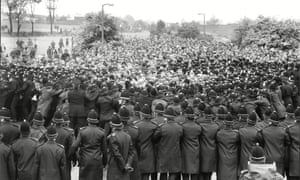
‘Following the battle, 95 miners were charged with riot, an offence which can carry a life sentence.’ Photograph: Mike Forster/Associated News/Rex
No one died at Orgreave, but it was clearly the intention of the police to create what felt like a life-threatening situation. The police faced no threat from the miners at Orgreave that warranted such a violent response, but it was obvious to those present that the police knew they could act with impunity.
Following the battle, 95 miners were charged with riot, an offence which could carry a life sentence. Gareth Peirce, one of the defending solicitors in the abortive trial that followed, wrote in the Guardian in 1985: “Orgreave … revealed that in this country we now have a standing army available to be deployed against gatherings of civilians whose congregation is disliked by senior police officers. It is answerable to no one; it is trained in tactics which have been released to no one, but which include the deliberate maiming and injuring of innocent persons to disperse them, in complete violation of the law.”
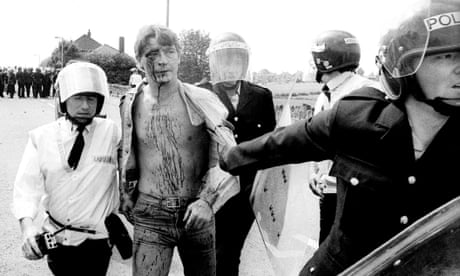
Miners' strike: IPCC considers unredacted Orgreave report
I wasn’t in court when the prosecution of the Orgreave miners was thrown out because the evidence did not stack up. But the trial revealed the way police would collaborate and coordinate evidence in order to get convictions or cover up the truth. In this sense, Orgreave can be seen as a dry run for what happened after the Hillsborough disaster in 1989. Had the South Yorkshire force not been allowed to get away with what they did at Orgreave, perhaps Hillsborough would never have happened.
As the Hillsborough inquest verdicts have shown, we cannot have an unaccountable police force charged with upholding the rule of law but immune to it. We need to know which politicians or officials gave such immunity to the police, if it was given.
Only a full public inquiry into Orgreave will get at the truth, an inquiry to which all documents must be revealed in unredacted form. This inquiry would not just be in the interests of the miners injured on that day, and in the interests of their families. It would be in all our interests, because we all need to understand how a police force came to believe it was a law unto itself. If we don’t, we risk creating the conditions in which another Hillsborough or Orgreave could happen.
In 1985 the miners shouted from the rooftops, but we weren’t heard. Ignored by the media, many gave up. What happened at Orgreave was not a human tragedy on the same scale as Hillsborough. But now, thanks to the tremendous campaign by the Hillsborough families who lost loved ones, and who refused to give up their fight for justice, we have the chance to discover the truth about what happened at Orgreave too.
Police covered up their attacks on striking miners. And they used the same tactics after the football tragedy.

‘For those of us who were there when the ranks of police suddenly opened up and launched a cavalry charge, it felt like civil war.’ Photograph: Photofusion/Rex
Just eight miles separates the patch of ground on the outskirts of Sheffield where Orgreave coking plant once stood from Hillsborough stadium, where 96 people were unlawfully killed on 15 April 1989. To those of us involved in the miners’ strike in south Yorkshire in the 1980s, the so-called “battle of Orgreave” and Britain’s worst football disaster have always been linked.
It was a glorious summer’s day on 18 June 1984. With my son and other mineworkers, I set off for Orgreave to take part in a mass demonstration to try to stop coke being moved from the plant to the steelworks at Scunthorpe.
The miners were in a jovial mood, dressed in T-shirts and plimsolls. To save on petrol most of us travelled four or five to a car. We had been on strike for more than three months, had very little money and relied on the £2 picketing money from the union to pay for petrol. Our destination was to be the scene of one of the bloodiest battle grounds in Britain’s industrial history.
We went to Orgreave to fight to save our industry from what has since been revealed, following the release of cabinet papers in January 2014, as a government plan to kill off the coal mining industry, close 75 pits at a cost of approximately 75,000 jobs, and destroy the National Union of Mineworkers.
The battle of Orgreave was a one-sided contest, as miners suddenly found themselves facing not a police force, but a paramilitary force dressed in riot gear, wielding long truncheons, with strategically placed officers with dogs, and a cavalry charge reminiscent of a medieval battleground.
For those of us who were there when the ranks of police suddenly opened up and launched the charge on horseback, it felt like civil war. Miners had no defence other than to try and outrun the horses. Furthermore, we had to run uphill. Many miners were caught and battered to the ground with truncheons, then outnumbered by police on foot before being roughly handled as they were arrested. Those of us who made it to the top of the hill found refuge in a supermarket or in the nearby mining village.

‘Following the battle, 95 miners were charged with riot, an offence which can carry a life sentence.’ Photograph: Mike Forster/Associated News/Rex
No one died at Orgreave, but it was clearly the intention of the police to create what felt like a life-threatening situation. The police faced no threat from the miners at Orgreave that warranted such a violent response, but it was obvious to those present that the police knew they could act with impunity.
Following the battle, 95 miners were charged with riot, an offence which could carry a life sentence. Gareth Peirce, one of the defending solicitors in the abortive trial that followed, wrote in the Guardian in 1985: “Orgreave … revealed that in this country we now have a standing army available to be deployed against gatherings of civilians whose congregation is disliked by senior police officers. It is answerable to no one; it is trained in tactics which have been released to no one, but which include the deliberate maiming and injuring of innocent persons to disperse them, in complete violation of the law.”

Miners' strike: IPCC considers unredacted Orgreave report
I wasn’t in court when the prosecution of the Orgreave miners was thrown out because the evidence did not stack up. But the trial revealed the way police would collaborate and coordinate evidence in order to get convictions or cover up the truth. In this sense, Orgreave can be seen as a dry run for what happened after the Hillsborough disaster in 1989. Had the South Yorkshire force not been allowed to get away with what they did at Orgreave, perhaps Hillsborough would never have happened.
As the Hillsborough inquest verdicts have shown, we cannot have an unaccountable police force charged with upholding the rule of law but immune to it. We need to know which politicians or officials gave such immunity to the police, if it was given.
Only a full public inquiry into Orgreave will get at the truth, an inquiry to which all documents must be revealed in unredacted form. This inquiry would not just be in the interests of the miners injured on that day, and in the interests of their families. It would be in all our interests, because we all need to understand how a police force came to believe it was a law unto itself. If we don’t, we risk creating the conditions in which another Hillsborough or Orgreave could happen.
In 1985 the miners shouted from the rooftops, but we weren’t heard. Ignored by the media, many gave up. What happened at Orgreave was not a human tragedy on the same scale as Hillsborough. But now, thanks to the tremendous campaign by the Hillsborough families who lost loved ones, and who refused to give up their fight for justice, we have the chance to discover the truth about what happened at Orgreave too.
Wednesday, 26 June 2013
Politicians who demand inquiries should be taken out and shot
From Stephen Lawrence to Bloody Sunday, an inquiry serves as the establishment's get out of jail free card
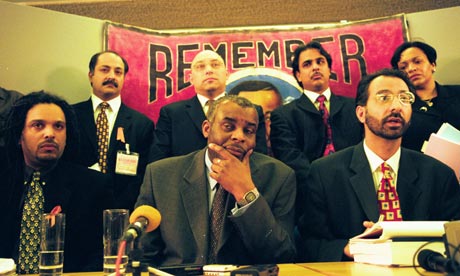
Neville Lawrence, Stephen Lawrence's father, at a press conference responding to the publication in 1999 of the report of the Macpherson inquiry into the Stephen Lawrence killing. 'The call for yet another inquiry into the Stephen Lawrence murder – by some counts the 17th – must make it the most interrogated death in history.' Photograph: Sean Smith for the Guardian
There should be a public inquiry. Indeed there should be a judicial inquiry, a veritable "judge-led" inquiry. Into what? That does not matter. An inquiry has become the cure-all for any political argument. Whether the subject is a dud police force, a dud hospital, a dud quango or a dud war, only a judicial inquiry will atone for wrongdoing and do penance for public sins.
An inquiry defers blame. It throws the ball into the long grass and kicks the can down the road. This week's call for yet another inquiry into the Stephen Lawrence murder – by some counts the 17th – must make it the most interrogated death in history. As withBloody Sunday and Hillsborough, a British scandal is measured not in deaths but in juridical longevity.
Politicians who demand inquiries should be taken out and shot. In almost every failure in a public service – run by or regulated by ministers – we know perfectly well what happened and who was in charge. Guilt should lie at the top, or at some recognised cut-off point. An inquiry merely replaces the straight, sure arrow of accountability with the crooked line of pseudo justice. It is the establishment's get out of jail free card.
For a minister to set up an inquiry – or his opponent to call for one – is like a bankrupt board of directors calling in consultants. The hope is that it may soften the line of blame, fog the argument, postpone the day of reckoning. A minister declares, "I have asked the distinguished Lord Justice So-and-So to leave no stone unturned." By the time he does, the minister prays he may have moved on. The furniture of blame will have rearranged itself.
Almost all public inquiries are nowadays political. In 1998 Tony Blair, eager to push forward his Ulster peace process, set up yet another inquiry into Bloody Sunday. The Saville inquiry became a scandal of judicial extravagance and delay (into which, of course, there was no inquiry). In 2009 Gordon Brown wished to take the heat out of the Iraq war before an election. He set up the Chilcot inquiry, now so dormant it can be of use only to scholars of latter-day Blairism. Two years later David Cameron, under attack for his links to News Corporation, sought a judge known to be eager for higher office and chose Lord Justice Leveson to investigate press ethics. From the resulting shambles Cameron escaped scot free.
In the Victoria Climbié inquiry of 2001, thunderbolts of damnation were hurled on to the heads of hapless social workers. Trials and inquiries cursed officials, police, councillors and local managers. Lord Laming's subsequent report came up with 108 recommendations, so many as to allow responsibility to disperse like seeds from a dandelion. When a minister says "we are all to blame", he means no one is.
The recent bevy of inquiries into the Staffordshire and Cumbrian hospital scandals has shone a mesmerising light on modern quangocracy. Highly paid officials with ill-defined jobs that are nothing to do with health argue over who said what, when and to whom. The row cannot save a single patient, while the resources diverted must jeopardise thousands. The salaries and fees roll on.
Government by retrospective inquiry is not government at all. It is a first rough stab at history. Its strangest feature is the deference shown to lawyers and legal process. All professions have their biases and the law is no exception. The sanctity of court process, important in trying a criminal case, is hardly relevant to the politicised context of a modern public inquiry. Judges, for good reason, do not speak the language of politics. As we can see from their hysteria over legal aid, they certainly have no comprehension of budgetary priorities.
Those attending the 2003 Hutton inquiry into the death of David Kelly found it an eerily legalised process. It led to a whitewash so unconvincing it had to be repeated, in effect, a year later by Lord Butler. The Leveson inquiry was likewise conducted as if it were a trial of the press for the mass murder of celebrity reputations. No attention was paid to the ethics of the electronic media, let alone to those of lawyers who were equally assiduous users of hacking services. The reality is that inquiries set up to get politicians off a hook usually do so by finding some other individual or group to hang on that same hook.
De Tocqueville remarked that the intrusion of lawyers into every corner of government meant that "scarcely any political question … is not resolved into a judicial question". A lawyer is to a modern politician what a priest was to a medieval one – someone on hand to help in a scrape, to dispense indulgence for wickedness.
If political accountability were truly a matter for judicial determination, parliament could pass laws and go home, leaving judges to decide on their efficacy. Everything could be rolled into one ongoing, everlasting public inquiry, to which every political upset could be referred for trial and execution. Parliament could be removed to the royal courts of justice with the lord chief justice as Mr Speaker.
We know what this would be like. We can see it today following the centralisation of town and country planning by Cameron's eccentric commissar, Eric Pickles. Local plans and decisions based on them have been superseded by Pickles's targets and instructions to his planning inspectors. This plays so fast and loose with local discretion that any planning application is worth taking to appeal. Planning is no longer a local function but determined ad hoc by Whitehall inspectors, followed by public inquiries and potential judicial review. It is not planning but financial combat.
As a result, planning is set to join immigration in the soaring total of judicial reviews. What was once a relatively smooth mechanism for deciding what sort of building should occur and where has become a judicial free-for-all (or rather costly-for-all). Expediting government through legal process is a contradiction in terms.
Democracy cannot work without a clear line between a decision and someone who can be held responsible. That means clear when the decision is taken, not clear to subsequent inquiry. Big centralised organisations such as the NHS stretch that line to breaking point. Public inquiries validate that breakage. They are a menace. Lawyers should stick to the law. Elected politicians who screw up should come clean and resign.
Tuesday, 25 June 2013
With the Met Police, if you are innocent you have everything to worry about
Peter Francis's revelations show the need for a judicial inquiry – so the public can see how far our democracy has been eroded
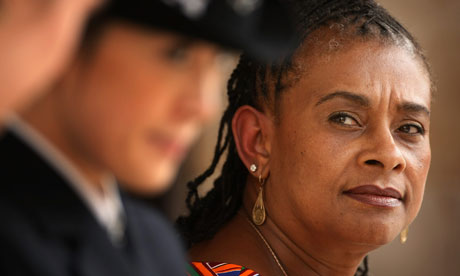
Doreen Lawrence in 2008 at the memorial service marking 15th anniversary of the murder of her son, Stephen.
The revelations by the former NSA operative, Edward Snowden (now to be charged with espionage himself), about the massive extent of state snooping on telephone calls and internet traffic, shocked even the most sanguine. The authorities, however, on both sides of the Atlantic, came out with the same stock response verging on justification: if you are innocent you have nothing to worry about.
The quite disgraceful conduct of police undercover agents described by another whistleblower, Peter Francis, gives the lie to this complacent and arrogant mantra. The perfectly innocent family of Stephen Lawrence was targeted in an attempt to discredit and undermine its quest for truth. Not for the first time has the state tried to depict victims and their families as disreputable and unworthy of belief: Bloody Sunday, Jean Charles de Menezes and Hillsborough are other recent examples.
Besides institutional racism it seems the Metropolitan police was also guilty of institutional deceit. A whole unit was established in order to manage and practise this, within the special demonstration squad (SDS). So much for another mantra commonly trotted out by our leaders that we enjoy freedom of expression and the right to peaceful protest. This will come as no surprise to experienced observers (eg CND in the 1980s, which faced a well-funded government anti-CND propaganda unit and constant surveillance). It is not remotely comforting or reassuring to know that the SDS was disbanded in 2008, given the existence of another outfit, the National Public Order Intelligence Unit, which was charged with tracking green activists.
SDS employed in the region of 130 officers and a number of those were deputed to scratch around for anything they could find on the Lawrences at the very time they should have been devoting resources to what was to become a thoroughly incompetent investigation. They failed to make arrests based on reliable information received within 24 hours; instead we now know that Francis was acquiring alternative information on Stephen's friend and main witness Duwayne Brooks, which might undermine his credibility. Subsequent charges against him were later dismissed.
Additionally, it appears efforts were being made to discover who visited the Lawrence family home and who was involved in a support group, Youth Against Racism. Both home and group were being invaded on an entirely spurious basis.
The general background is far wider than the Lawrence case, embracing many other areas and activities. Officers have adopted false identities, often those of dead infants, played roles which involved intimate relationships with women who rightly feel desperately abused and has been described by one as "like being raped by the state". The Mark Kennedy saga is an exemplification of the scope and depth of infiltration.
In January this year, Maina Kiai, the UN special rapporteur on the rights to freedom of peaceful assembly and of association, provided a highly critical report on violations of human rights in the UK. One of the matters he focused on was the use of undercover policing. He recommended a review of the Investigatory Powers Act 2000 and a judge-led inquiry. Neville Lawrence has demanded exactly that in an interview with the BBC. He is right: we are dealing with potentially unlawful practices and fundamental breaches of the European convention, especially with regard to privacy.
At present there are 16 different inquiries taking place. One of them is Operation Herne, conducted by the chief constable of Derbyshire under the direction of the IPCC. Another is going to be an extension of the Mark Ellison QC review into the question of corruption.
This is manifestly inadequate. Fragmented, protracted and disparate inquiries behind closed doors, let alone carried out by police officers, will hardly restore public confidence already severely dented by denial and deceit. There has to be an independent judge-led public inquiry which incorporates the potential for accountability and transparency. A forum along the lines of Leveson is imperative, so the public can be made aware of how far our democracy has been eroded, and it needs to address the following questions:
1. Authorisation: a squad as big as this does not exist for more than 40 years without approval, if only tacit, at the very highest level. Who knew about it and to whom was it accountable?
2. What were its terms of reference, especially with regard to the unit described by Francis?
3. Funding: substantial sums of public money must have been devoted to this operation. Which budget was used? Who authorised it?
4. Method: who authorised the various techniques employed?
5. Monitoring: how was it regulated? What was Her Majesty's Inspectorate of Constabulary doing? Did they ask the right questions? Were they told the truth?
6. Who decided that the operation would not be disclosed to the Macpherson inquiry?
Once more we must expose collusion, corruption and manipulation. There can be no justice without truth.
Thursday, 26 April 2012
Rupert Murdoch at the Leveson Inquiry
Rupert Murdoch gives away more than planned at Leveson inquiry
The denials never shifted but, under careful questioning from Robert Jay QC, the tycoon made some serious concessions
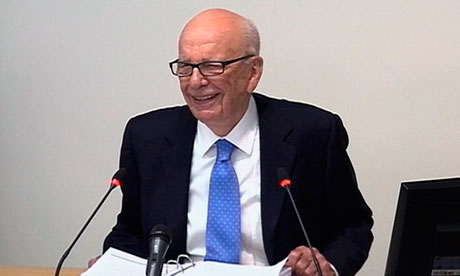
Rupert Murdoch often departed from the script in his evidence at the Leveson inquiry. Photograph: Reuters
At one point in his evidence, when he was trying to explain how he dealt with politicians, Rupert Murdoch volunteered: "I'm not good at holding my tongue." It must drive his advisers crazy.
The plan clearly was for Castle Murdoch to be defended with well-constructed walls of obdurate denial, reinforced by occasional bouts of forgetfulness. Certainly, the denials never shifted – and these were big, tough denials: "I've never asked a prime minister for anything in my life … We have never pushed our commercial interests in our papers … I don't know many politicians."
However, in the event, Robert Jay QC kept piercing small gaps in Murdoch's defences. This was partly because Jay had gathered up a prodigious supply of facts, which he fired like slingshot at the castle walls – and partly because the old mogul likes to talk. Jay didn't break in and ransack the place, but he did some damage.
Sometimes the wounds were nothing more than dents in Murdoch's standing, as he acknowledged that it might well be true that he had once listened to Ken Livingstone on television denouncing the "lies and smears of the media" and that he had then declared drunkenly to a roomful of people, "That's me!" Or that he might well have qualified his early approval for Tony Blair by adding that they were not yet ready to take their pants down together.
But sometimes, in the detail behind the denial, he conceded substantial ground. His underlying problem was that he was not listening to Jay and failed to see the subtlety of the allegation that faced him.
Murdoch kept denying that he made deals with politicians, ie, that he simply offered them the support of his paper in return for favours to his business. But Jay suggested: "It operates at a far more sophisticated level, doesn't it?" and went on to quote the reported words of the former Australian prime minister Paul Keating: "You can do a deal with him without ever saying a deal is done."
In the case of Murdoch's relationship with Blair, Jay quoted Murdoch's former editor, Andrew Neil, that there had been "an implicit understanding – never openly talked about between the two men – but an understanding nevertheless".
Murdoch duly put up his well-rehearsed denial – "I never asked Mr Blair for anything, nor did I receive any favour" – and then proceeded to volunteer that he had been in the habit of seeing Blair two or three times a year, as though that were an annual average for most voters to see a national leader.
He described how he had once spent an afternoon at Chequers, telling Blair how much he opposed Britain joining the euro, as though the prime minister had nothing better to do.
To this extraordinary degree of access, he boldly added that he does indeed direct the editorial line of the Sun on major issues, including questions about Europe. And, once again failing to hold his tongue, he went right ahead and admitted what this would mean to a man like Blair: "If any politician wanted my views on major issues, they only had to read the Sun." The Sun relentlessly reinforced the anti-EU message.
Murdoch continued to deny that Blair had ever done anything for him, but then conceded that Blair had "gone the extra mile for him" over European policy, to the point where he had acceded to the Sun's demand that the government should agree to hold a referendum before accepting the new EU constitution.
And Blair had done something very similar by ensuring Britain maintained tough anti-union laws and then underlined the point with an article in the Sun, following which the two men had enjoyed dinner together. Murdoch agreed it was possible he had congratulated Blair on his position.
Similarly, Jay quoted Murdoch's former confidant, Woodrow Wyatt, who was close to Margaret Thatcher and who recorded in his diary that he had once told Murdoch: "Margaret is very keen on preserving your position. She knows how much she depends on your support. Likewise, you depend on her." Murdoch produced his standard denial – "I didn't expect any help from her, nor did I ask for any" – and then found himself accepting that, while the Sun supported her, she had delivered a series of decisions which looked really very helpful indeed, including allowing him to buy the Times and the Sunday Times without referring his bid to the Monopolies and Mergers Commission. She also exempted BSkyB from the regulations in the 1990 Broadcasting Act.
With Gordon Brown and David Cameron, he kept closer to the script but, even so, he caused unnecessary trouble.
He denied discussing the BBC licence fee with Cameron. Enough said. Talking to a prime minister about the licence fee might suggest he had some commercial motive. But then his tongue added: "I wasn't interested in the BBC licence fee. I had been through that with previous prime ministers, and it didn't matter. They all hated the BBC, and they all gave it whatever it wanted."
He set the record straight on Kelvin MacKenzie's claim that Brown had reacted to the Sun's endorsement of the Tories in September 2009 by phoning him and roaring down the phone for 20 minutes. That was "a very colourful exaggeration", he said. Enough? No. He went on to quote a version of the call which was highly likely to provoke a response from Brown, who duly issued a statement saying that Murdoch was wholly wrong and should have the good grace to correct his account.
As he left the inquiry for a break, his tongue was still rolling. Dan Sabbagh, the Guardian's head of media, heard him grumble to his advisers about Lord Justice Leveson: "Let's get him to get this fucking thing over with today." If only they could. Murdoch resumes his evidence on Thursday morning.
The plan clearly was for Castle Murdoch to be defended with well-constructed walls of obdurate denial, reinforced by occasional bouts of forgetfulness. Certainly, the denials never shifted – and these were big, tough denials: "I've never asked a prime minister for anything in my life … We have never pushed our commercial interests in our papers … I don't know many politicians."
However, in the event, Robert Jay QC kept piercing small gaps in Murdoch's defences. This was partly because Jay had gathered up a prodigious supply of facts, which he fired like slingshot at the castle walls – and partly because the old mogul likes to talk. Jay didn't break in and ransack the place, but he did some damage.
Sometimes the wounds were nothing more than dents in Murdoch's standing, as he acknowledged that it might well be true that he had once listened to Ken Livingstone on television denouncing the "lies and smears of the media" and that he had then declared drunkenly to a roomful of people, "That's me!" Or that he might well have qualified his early approval for Tony Blair by adding that they were not yet ready to take their pants down together.
But sometimes, in the detail behind the denial, he conceded substantial ground. His underlying problem was that he was not listening to Jay and failed to see the subtlety of the allegation that faced him.
Murdoch kept denying that he made deals with politicians, ie, that he simply offered them the support of his paper in return for favours to his business. But Jay suggested: "It operates at a far more sophisticated level, doesn't it?" and went on to quote the reported words of the former Australian prime minister Paul Keating: "You can do a deal with him without ever saying a deal is done."
In the case of Murdoch's relationship with Blair, Jay quoted Murdoch's former editor, Andrew Neil, that there had been "an implicit understanding – never openly talked about between the two men – but an understanding nevertheless".
Murdoch duly put up his well-rehearsed denial – "I never asked Mr Blair for anything, nor did I receive any favour" – and then proceeded to volunteer that he had been in the habit of seeing Blair two or three times a year, as though that were an annual average for most voters to see a national leader.
He described how he had once spent an afternoon at Chequers, telling Blair how much he opposed Britain joining the euro, as though the prime minister had nothing better to do.
To this extraordinary degree of access, he boldly added that he does indeed direct the editorial line of the Sun on major issues, including questions about Europe. And, once again failing to hold his tongue, he went right ahead and admitted what this would mean to a man like Blair: "If any politician wanted my views on major issues, they only had to read the Sun." The Sun relentlessly reinforced the anti-EU message.
Murdoch continued to deny that Blair had ever done anything for him, but then conceded that Blair had "gone the extra mile for him" over European policy, to the point where he had acceded to the Sun's demand that the government should agree to hold a referendum before accepting the new EU constitution.
And Blair had done something very similar by ensuring Britain maintained tough anti-union laws and then underlined the point with an article in the Sun, following which the two men had enjoyed dinner together. Murdoch agreed it was possible he had congratulated Blair on his position.
Similarly, Jay quoted Murdoch's former confidant, Woodrow Wyatt, who was close to Margaret Thatcher and who recorded in his diary that he had once told Murdoch: "Margaret is very keen on preserving your position. She knows how much she depends on your support. Likewise, you depend on her." Murdoch produced his standard denial – "I didn't expect any help from her, nor did I ask for any" – and then found himself accepting that, while the Sun supported her, she had delivered a series of decisions which looked really very helpful indeed, including allowing him to buy the Times and the Sunday Times without referring his bid to the Monopolies and Mergers Commission. She also exempted BSkyB from the regulations in the 1990 Broadcasting Act.
With Gordon Brown and David Cameron, he kept closer to the script but, even so, he caused unnecessary trouble.
He denied discussing the BBC licence fee with Cameron. Enough said. Talking to a prime minister about the licence fee might suggest he had some commercial motive. But then his tongue added: "I wasn't interested in the BBC licence fee. I had been through that with previous prime ministers, and it didn't matter. They all hated the BBC, and they all gave it whatever it wanted."
He set the record straight on Kelvin MacKenzie's claim that Brown had reacted to the Sun's endorsement of the Tories in September 2009 by phoning him and roaring down the phone for 20 minutes. That was "a very colourful exaggeration", he said. Enough? No. He went on to quote a version of the call which was highly likely to provoke a response from Brown, who duly issued a statement saying that Murdoch was wholly wrong and should have the good grace to correct his account.
As he left the inquiry for a break, his tongue was still rolling. Dan Sabbagh, the Guardian's head of media, heard him grumble to his advisers about Lord Justice Leveson: "Let's get him to get this fucking thing over with today." If only they could. Murdoch resumes his evidence on Thursday morning.
Subscribe to:
Comments (Atom)


